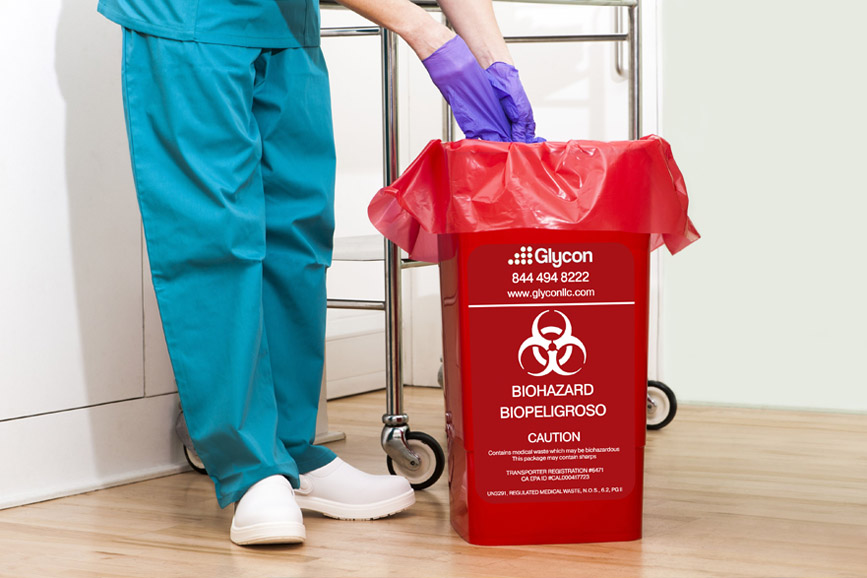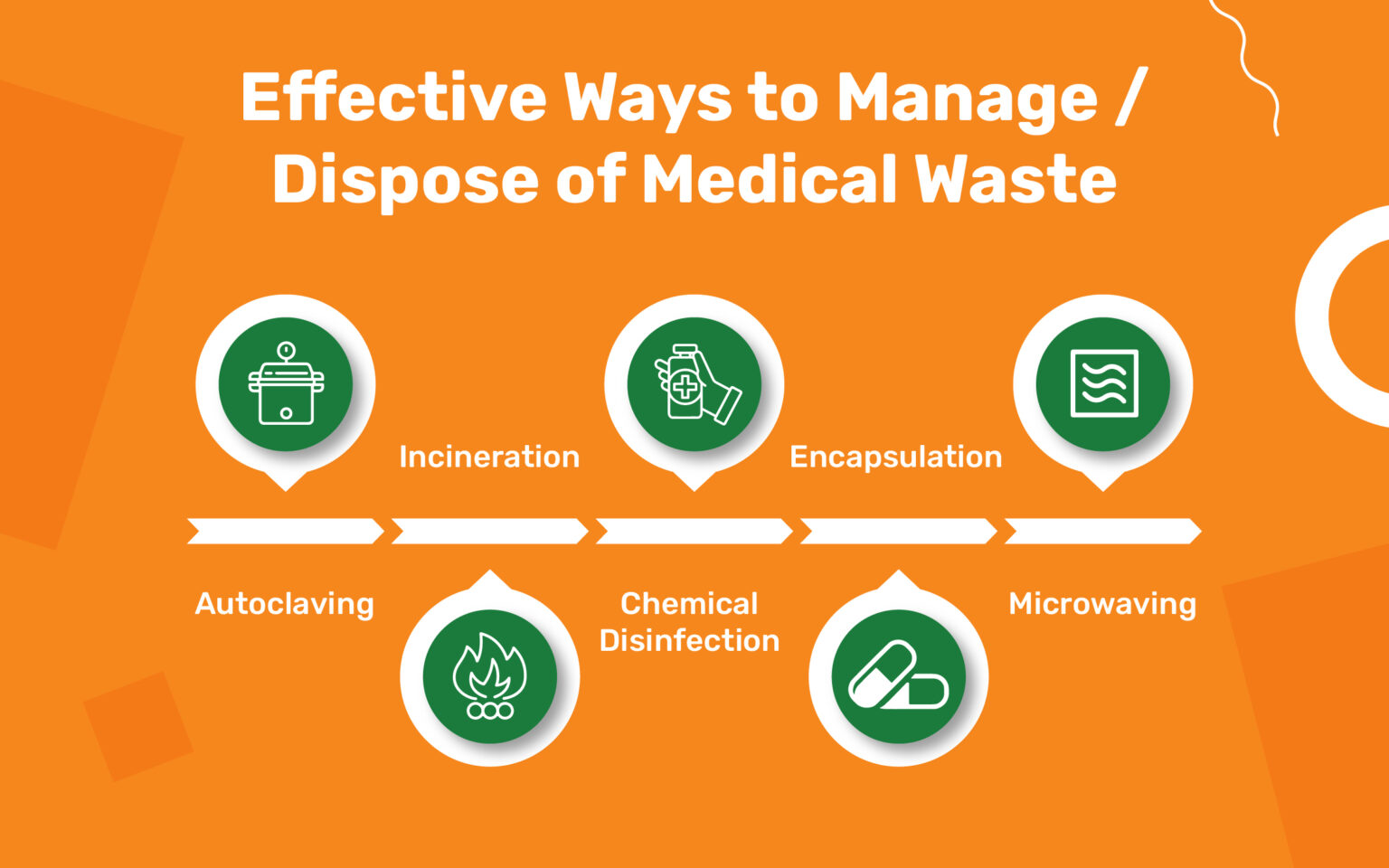Remain Ahead of Regulations: Specialist Suggestions on Medical Garbage Disposal
In a globe where the healthcare industry is frequently progressing, it is vital for medical centers to stay ahead of policies when it comes to the proper disposal of medical waste. From comprehending the various categories of medical waste to carrying out the ideal collection and partition approaches, this conversation will certainly give actionable pointers and useful insights to assist centers remain in advance of guidelines in the ever-changing landscape of clinical waste disposal.
Recognizing Medical Waste Categories
Understanding medical waste groups is vital for appropriate disposal and monitoring in health care centers. Clinical waste describes any waste created by medical care activities that might position a risk to public wellness or the setting. It is important to classify medical waste properly to guarantee its secure handling, transport, therapy, and disposal.
There are numerous classifications of medical waste that healthcare facilities need to be aware of. One of the most typical categories include transmittable waste, pathological waste, sharps waste, pharmaceutical waste, and chemical waste. Each classification has details standards and guidelines for its correct management and disposal.
Pathological waste refers to human tissues, organs, or body parts that call for special handling and disposal. Pharmaceutical waste comprises expired, extra, or polluted drugs that need cautious handling and disposal.
Staying Up-To-Date With Regulatory Changes
Staying existing with regulatory changes is critical for healthcare centers to ensure conformity and appropriate administration of clinical garbage disposal. medical waste removal. With laws continuously evolving, it is crucial for health care facilities to stay updated to prevent charges, penalties, and prospective harm to the setting and public health and wellness
To stay ahead of regulative modifications, medical care centers need to develop a system for surveillance and monitoring updates. This can be done by registering for regulatory newsletters, going to workshops and conferences, and actively joining market associations. Additionally, centers ought to designate a personnel or group in charge of remaining notified and disseminating info to appropriate stakeholders.
Routine interaction with governing agencies is additionally important. Medical care centers must develop relationships with neighborhood, state, and federal agencies to guarantee they understand any kind of adjustments in regulations that may impact their waste monitoring practices. This can be done through regular meetings, participation in public remark periods, and positive interaction with regulatory agencies.
Moreover, medical care centers should think about partnering with waste administration business that specialize in medical garbage disposal (medical waste disposal services with WasteX). These companies are typically skilled in the most up to date guidelines and can offer guidance and support to ensure compliance
Executing Proper Collection and Partition Techniques
To efficiently take care of medical garbage disposal, health care facilities need to develop appropriate collection and segregation techniques based on governing standards. Executing these techniques guarantees the risk-free handling and disposal of potentially harmful products, shields the environment, and minimizes the risk of injuries and infections to medical care employees and the public.
Correct collection and segregation methods entail using assigned containers and labeling systems. Healthcare centers must supply plainly labeled containers for various kinds of medical waste, such as sharps, contagious waste, pharmaceutical waste, and non-hazardous waste. These containers ought to be color-coded and plainly significant to avoid confusion and advertise simple recognition.
Additionally, healthcare centers should train their staff on the appropriate procedures for collecting and segregating medical waste. This consists of educating them on the various sorts of waste, the appropriate containers to utilize, and the importance of complying with regulations and guidelines. Routine training sessions and correspondence course need to be performed to make certain that personnel participants stay current on ideal methods.
In addition, healthcare centers need to establish a system for regular collection and disposal of clinical waste. This may include partnering with qualified waste management companies that concentrate on clinical garbage disposal. These firms will certainly make sure that the gathered waste is transferred and thrown away in compliance with regulatory needs.
Picking the Right Disposal Approaches

Incineration is among the most reliable and typical methods for throwing away certain kinds of medical waste, such as pathological waste and sharps. It entails the controlled burning of waste at heats, reducing it to ash. anchor Incineration can launch dangerous contaminants right into the air and add to air pollution.

Chemical treatment involves the use of chemicals to reduce the effects of the waste and disinfect. Microwave treatment uses microwave power to warmth and decontaminate the waste.
Making Sure Conformity Through Paperwork and Training
After meticulously considering the appropriate disposal techniques for medical waste, medical care facilities should make certain compliance with laws and minimize environmental influence by applying efficient documents and training treatments. This step is essential in maintaining a safe and lasting environment for both healthcare workers and the public.

Health care employees that manage medical waste should get appropriate training on waste segregation, managing, and disposal procedures. By giving extensive training, medical care centers can equip their staff to make educated choices and lessen the danger of improper waste see it here disposal.
Final Thought
Finally, staying ahead of regulations in clinical waste disposal is vital for health care facilities. medical waste removal service. Comprehending the different classifications of clinical waste, staying upgraded with regulative modifications, executing proper collection and segregation techniques, choosing the proper disposal techniques, and making certain conformity with documentation and training are all necessary steps. By adhering to these standards, healthcare companies can successfully get rid of and take care of of medical waste in a responsible and secure fashion
From comprehending the different categories of medical waste to carrying out the ideal collection and partition techniques, this discussion will offer useful understandings and actionable tips to aid centers remain ahead of policies in the ever-changing landscape of clinical waste disposal. - medical waste disposal services with WasteX
The most usual groups include infectious waste, pathological waste, sharps waste, pharmaceutical waste, and chemical waste. Medical care facilities must provide plainly classified containers for different kinds of clinical waste, such as sharps, transmittable waste, pharmaceutical waste, and non-hazardous waste. Medical care facilities should develop a detailed system to videotape and track all aspects of medical waste disposal, including kinds of waste produced, amounts, and disposal methods used. Health care workers that take care of clinical waste must receive suitable training on waste segregation, taking care of, and disposal treatments.